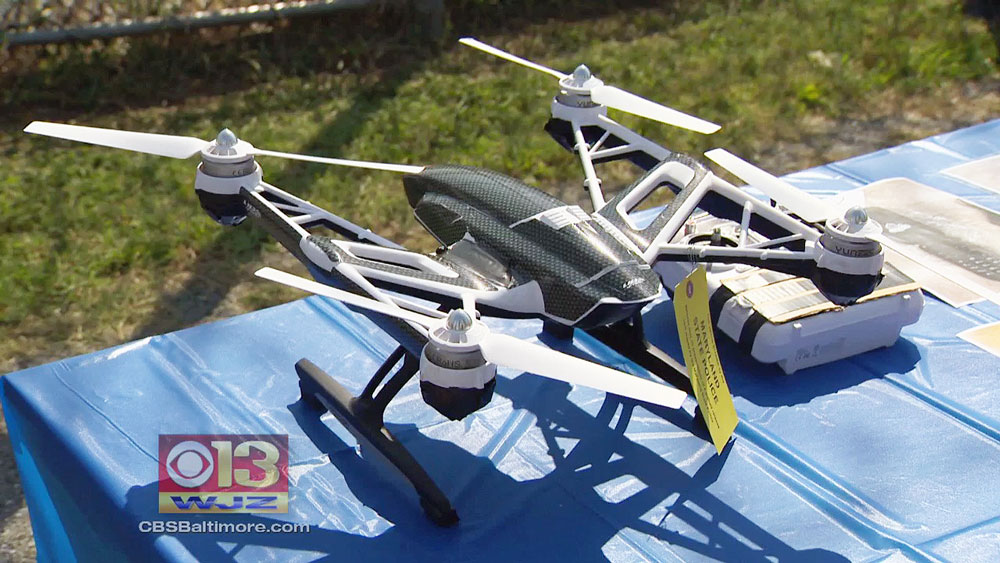
Robohub.org
The Drone Center’s Weekly Roundup: 1/18/16

A US jury convicted Thaddeus Shortz of intending to use a drone to smuggle contraband into a Maryland prison. During the trial, witnesses testified that Shortz had confessed to smuggling contraband into the Western Correctional Institution on several previous occasions. Image credit: CBS Baltimore
News
A U.S. drone strike in Yemen reportedly killed three members of al-Qaeda in the Arabian Peninsula. The strike targeted a vehicle traveling in Shabwa province. It was the first drone strike in Yemen so far this year. (Reuters)
A California state senator introduced legislation that would place new limits on commercial and recreational drone use. The State Remote Piloted Aircraft Act would prohibit drone flights over state parks and infrastructure. A 2015 bill restricting drone flights in California was vetoed by Governor Jerry Brown. (KQED) For more on state drone legislation, click here.
South Korean forces fired warning shots in the direction of a North Korean drone that was flying along the border between the two countries. The drone returned to North Korean territory following the shots. Over the past several years, North Korea has repeatedly attempted to fly drones south of the border. (Time)
German Defense Minister Ursula von der Leyen announced to reporters that Germany plans to lease Israeli drones instead of buying American-made MQ-9 Reapers. The Defense Ministry intends to lease three to five IAI Herons from 2018 until European nations develop an indigenous drone. (Haaretz)
A U.S. jury convicted Thaddeus Shortz of intending to use a drone to smuggle contraband into a Maryland prison. Shortz, 25, who was convicted of 31 offenses, faces more than 50 years in prison. During the trial, witnesses testified that Shortz had confessed to smuggling contraband into the Western Correctional Institution on several previous occasions. (ABC News)
Meanwhile, the U.S. Customs and Border Protection agency announced that it recovered over 30 pounds of marijuana that was dropped from a drone in Arizona. According to a press release, CBP agents spotted a drone flying from San Luis, Mexico and followed it to a drop zone, where it released three bundles of marijuana.
Commentary, Analysis, and Art
At Foreign Policy, Adam Rawnsley writes that China is surpassing the United States in exports of armed military drones.
At Newsweek, Seung Lee examines the ongoing suit against the FAA over its drone registration requirement.
At Slate, Justin Peters questions the utility of a follow-me drone like the Lily multirotor.
At Wired, David Hambling argues that swarms of drones are likely to “change the face of modern warfare.”
At Fusion, Alexis C. Madrigal interviews Zoe “Hexinair” Katherine, a competitive drone racer.
At the New York Times, Micah Zenko argues that drone strikes will be President Obama’s “lasting legacy.”
The Association of the United States Army hosted a discussion on the future of the Army’s drone programs. (Breaking Defense)
In a speech at an Aero Club event in Washington, D.C., Dave Vos, the head of Google X’s Project Wing, said that Google could launch a drone delivery service as soon as 2017.
At War on the Rocks, Scott Englund argues that the United States should do more to fight terrorism beyond targeting militant propagandists like Anwar al-Awlaki with drones.
Also at War on the Rocks, Robert Haddick considers how the Pentagon’s technology-heavy third offset strategy could present a difficult challenge to long standing operational concepts and cultures within the military.
At the Washington Post, Andrea Peterson and Matt McFarland write that drones are complicating questions of individual ownership of airspace.
At Defense One, Aliya Sternstein writes that the Pentagon suspects that China might have stolen the designs of American military ground robots.
At the Kingston Times, Jesse J. Smith writes about a local sheriff’s plans to purchase drones.
The nominations for the 2nd Annual New York City Drone Film Festival have been announced. The festival will run March 4-6, 2016. (TV Technology)
Know Your Drone
The U.S. National Oceanic and Atmospheric Association completed a new round of tests for its Coyote unmanned aircraft, which will be used to collect atmospheric data deep inside hurricanes. (Gizmag)
The Verge tried out the Hexo+, a new french consumer drone that can be controlled by waving your phone.
Popular consumer drone company Parrot has unveiled the Disco, a fixed wing unmanned aircraft with an in-built camera. (CNET)
Korean Air Aerospace Division has won a $300 million contract to develop several dozen tactical surveillance and reconnaissance drones for the Republic of Korea Army. (IHS Jane’s 360)
A Kickstarter campaign to fund the CoDrone, a cheap, fully programmable multirotor drone that costs around $100, has has already far surpassed its goal. (Geeky Gadgets)
Drones at Work
An underwater drone operated by a team of marine biologists captured close-up footage of a great white shark. (The Guardian)
The Sinclair Community College received permission from the FAA to design and fly drones. (Dayton Daily News)
Scientists from New Zealand’s Auckland University of Technology are using drones to measure the human impact on some areas of Antarctica. (NZ Herald)
For updates, news, and commentary, follow us on Twitter. The Weekly Drone Roundup is a newsletter from the Center for the Study of the Drone. It covers news, commentary, analysis and technology from the drone world. You can subscribe to the Roundup here.





